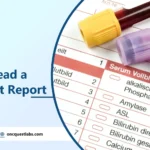Pediatric lab tests play a crucial role in the comprehensive healthcare of children, aiding healthcare professionals in diagnosing, monitoring, and managing various health conditions. These tests provide valuable insights into a child’s overall health, growth, and development. This article aims to explore the most common pediatric lab tests, shedding light on their significance, normal ranges, and the conditions they help identify.
Contents
Complete Blood Count (CBC)
The Complete Blood Count is a routine blood test that assesses various components of blood. In pediatric medicine, CBC is a fundamental tool used to evaluate a child’s overall health and diagnose a range of conditions, including anemia, infection, and certain genetic disorders. The test measures red blood cells (RBCs), white blood cells (WBCs), and platelets, providing insights into the body’s immune system, oxygen-carrying capacity, and clotting ability.
Normal values for CBC in children can vary depending on age, sex, and other factors. Anemia, which is a common condition in children, can be identified through a CBC by assessing hemoglobin and hematocrit levels.
Blood Chemistry Panel
Blood chemistry panels, also known as basic metabolic panels (BMP) or comprehensive metabolic panels (CMP), provide information about the levels of various chemicals and substances in the blood. This includes electrolytes, glucose, kidney function markers, and liver function markers. These tests are crucial for identifying metabolic imbalances, diabetes, kidney disease, and liver disorders in pediatric patients.
For instance, abnormal levels of blood glucose may indicate diabetes, while elevated liver enzymes (such as ALT and AST) may suggest liver dysfunction. Blood chemistry panels are particularly important in monitoring the effects of medications and assessing a child’s overall metabolic health.
Blood Lead Level
Lead poisoning is a serious health concern, especially in children, as it can cause developmental delays, learning disabilities, and behavioral issues. The blood lead level test measures the amount of lead in a child’s bloodstream. This test is often recommended for children living in older homes with lead-based paint or those who may be exposed to lead through other environmental sources.
Routine lead screening is crucial for early detection and intervention to prevent long-term health consequences. The acceptable blood lead level may vary, but public health authorities often define actionable levels that prompt further investigation and intervention.
Thyroid Function Tests
Thyroid function tests assess the thyroid gland’s ability to produce hormones that regulate metabolism and growth. In pediatric patients, these tests are commonly used to diagnose thyroid disorders, such as hypothyroidism and hyperthyroidism, which can impact a child’s physical and cognitive development.
Thyroid function tests typically include measurements of thyroid-stimulating hormone (TSH), free thyroxine (FT4), and free triiodothyronine (FT3). Abnormal levels of these hormones can indicate an underactive or overactive thyroid, requiring appropriate medical intervention.
Urinalysis
Urinalysis involves the examination of urine to detect various health issues, including kidney disorders, urinary tract infections (UTIs), and diabetes. In pediatric medicine, urinalysis is a valuable tool for evaluating hydration status, kidney function, and identifying potential underlying conditions.
Key components of urinalysis include the assessment of color, clarity, specific gravity, pH, protein, glucose, ketones, and the presence of cells or bacteria. Abnormalities in these parameters can help healthcare providers diagnose and manage a range of pediatric conditions.
Allergy Testing
Allergy testing in children is essential for identifying specific allergens that may trigger allergic reactions. These tests can include skin tests or blood tests (specific IgE tests) to detect sensitivities to common allergens such as pollen, dust mites, animal dander, and certain foods.
Understanding a child’s allergies is crucial for developing effective treatment plans and avoiding allergens that may cause respiratory, skin, or gastrointestinal symptoms. Allergy testing is particularly important for children with a family history of allergies or asthma.
Genetic Testing
Advances in genetic testing have revolutionized pediatric medicine by allowing healthcare professionals to identify genetic disorders early in a child’s life. Newborn screening tests, for example, are routinely conducted to detect conditions such as phenylketonuria (PKU), cystic fibrosis, and sickle cell disease.
Genetic testing can also be used for diagnostic purposes in cases where a child exhibits developmental delays, intellectual disabilities, or congenital anomalies. This type of testing enables healthcare providers to tailor treatment plans and interventions based on the child’s unique genetic makeup.
Additional Pediatric Lab Tests
1. C-reactive Protein (CRP):
CRP is a marker of inflammation in the body. Elevated levels may indicate infection or inflammation, aiding in the diagnosis of conditions such as bacterial infections, autoimmune disorders, or inflammatory bowel disease.
2. Erythrocyte Sedimentation Rate (ESR):
Similar to CRP, ESR is a marker of inflammation. It measures the rate at which red blood cells settle in a tube of blood. Elevated ESR levels may suggest the presence of inflammation or infection.
3. Coagulation Profile:
Coagulation tests, including prothrombin time (PT) and activated partial thromboplastin time (aPTT), assess the blood’s ability to clot. These tests are crucial in monitoring and managing bleeding disorders or assessing the effects of medications that affect blood clotting.
4. Iron Studies:
Iron studies, including serum iron, ferritin, and total iron-binding capacity (TIBC), help evaluate a child’s iron status. These tests are essential for diagnosing iron-deficiency anemia and guiding appropriate supplementation.
5. Lipid Profile:
Lipid panels measure cholesterol levels and are crucial for assessing cardiovascular health, even in pediatric patients. Abnormal lipid levels may indicate a predisposition to heart disease, especially in children with a family history of hyperlipidemia or premature cardiovascular disease.
6. Hemoglobin A1c (HbA1c):
HbA1c is a long-term marker of blood glucose levels and is commonly used in the management of diabetes. Regular monitoring of HbA1c levels helps healthcare providers assess the effectiveness of diabetes management strategies.
7. Vitamin D Levels:
Vitamin D is essential for bone health and overall development. Testing vitamin D levels is crucial, especially in children with limited sun exposure or dietary deficiencies, as low levels can lead to conditions like rickets or contribute to musculoskeletal problems.
8. Serum Electrolytes:
Electrolyte levels, including sodium, potassium, and chloride, are vital for maintaining proper fluid balance and nerve function. Imbalances can occur due to dehydration, kidney disorders, or certain medications, and monitoring these levels is crucial for pediatric patients.
9. Hormone Levels (e.g., Growth Hormone, Thyroid Hormones):
In cases of growth concerns or suspected endocrine disorders, testing hormone levels, such as growth hormone or thyroid hormones, provides insights into hormonal imbalances that may affect growth, development, and overall health.
10. Urine Culture:
When a urinary tract infection is suspected, a urine culture is conducted to identify the specific bacteria causing the infection. This test is essential for guiding antibiotic therapy and preventing complications.
CONCLUSION
Pediatric lab tests are indispensable tools for healthcare providers, assisting in the diagnosis, management, and prevention of various health conditions in children. From routine screenings like CBC and blood chemistry panels to specialized tests for lead poisoning, thyroid function, and genetic disorders, these tests provide a comprehensive picture of a child’s health.
Understanding the significance of common pediatric lab tests is essential for parents, caregivers, and healthcare professionals alike. Regular screenings, early detection, and appropriate interventions based on test results contribute to the overall well-being and healthy development of children. As medical science continues to advance, ongoing research and technological innovations will further enhance our ability to diagnose and treat pediatric conditions, ultimately improving outcomes for the youngest members of our communities.



![Blood Test for Hair Loss [Male/Female] Blood Test for Hair Loss](https://oncquest-blog.s3.ap-south-1.amazonaws.com/blog/wp-content/uploads/2023/12/12044200/Blood-Test-for-Hair-Loss.webp)

